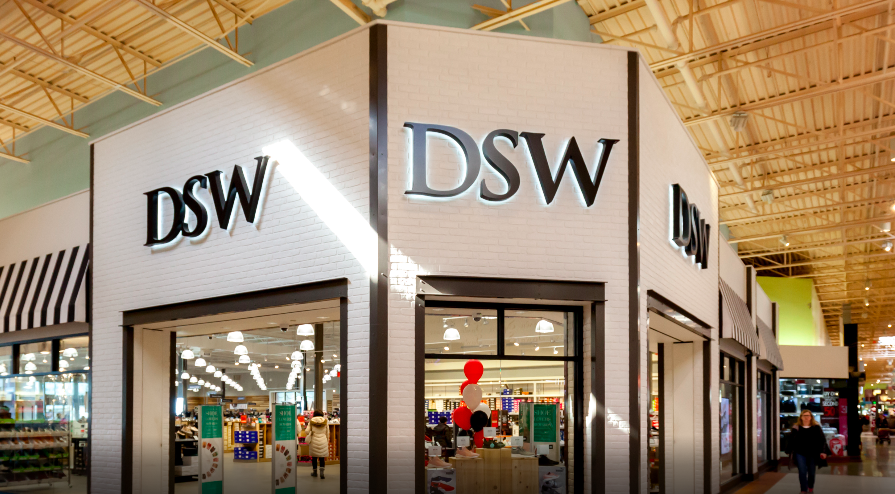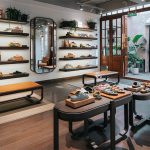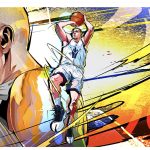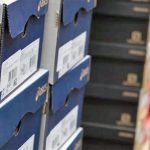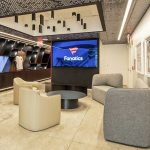Shares of Designer Brands, formerly DSW Inc., rose $1.06, or 5.9 percent, to $9.05 Thursday after the company matched Wall Street’s earnings expectations in the first quarter and increased its full-year guidance.
“Both our retail segments delivered strong revenue increases and healthy growth in gross profit rate over last year,” said Roger Rawlins, CEO, on a conference call with analysts. “Our distortion across North America to seasonal and kids products and a focus on key items fueled this profitability growth.”
Adjusted net income reached $33.6 million, or 43 cents a share, up 10.3 percent from a year ago, matching analysts’ forecasts.
Revenue jumped 23.4 percent to $878.5 million, beating Wall Street’s expectations of $872.5 million.
The revenue gain includes $51.8 million from the consolidation of the Canada Retail segment and $94.0 million from the Brand Portfolio segment that was formed with the acquisition of Camuto Group.
Gross margins increased 50 basis points due to margin expansion in the U.S. Retail segment and the impact of the exit of Ebuys during the previous year, partially offset by lower margins from the wholesale business of the Brand Portfolio segment.
Reported operating expenses, as a percent of revenue, increased by 180 basis points, driven by the impact of the acquired businesses.
Reported net income was $31.2 million, or 40 cents a share, including pre-tax charges totaling $3.2 million, or 3 cents per share, from integration and restructuring expenses, amortization of intangible assets and foreign currency transaction losses.
Higher Comps And Improved Margins Boost U.S. Retail
Operating income for the company’s legacy businesses, which is DSW and its Affiliated Business Group, grew 12 percent over last year, Jared Poff, CFO, said on the call. This was driven by healthy comp increases and margin enhancements.
At the U.S. Retail segment, comp sales grew 3 percent on top of last year’s 2 percent comp growth. This comp was driven by distortions in seasonal product and key items.
DSW’s largest category, women’s, grew comps by 2 percent while men’s lost traction and posted a 4 percent comp decline, Accessories were flat. Kids continues to be a strong performer, growing over 50 percent year-over-year as both the existing kids stores comped “very strongly” and DSW continues to reap the benefit of the final phase of its kids rollout that was completed in July 2018, according to Poff. Transactions in the U.S. Retail segment were up over 5 percent while ADS (average dollar sales) was down primarily driven by lower UPT (units per transaction).
Online sales grew 36 percent in U.S. retail in the quarter, benefiting from a shift in marketing dollars toward digital. DSW in the U.S. added 1.4 million new members to its loyalty programs on relatively flat spend dollars for the quarter.
U.S. retail gross profit rate for the quarter improved 70 basis points as IMU (initial mark-up) leverage and reduced markdowns more than offset the increase in shipping expense due to e-commerce growth. Exclusive brands provided nearly 50 basis points of this gross profit leverage. Exclusive brand sales accounted for 13 percent of total U.S. retail sales, representing a 42 percent increase year-over-year.
The Canadian Retail segment generated a profit during the quarter on “meaningful” gross margin improvement and positive same-store sales growth, which are not yet included in our consolidated comp calculation. The Canadian segment turned its first profit in five years. Said Rawlins, “The practices we have put in place at DSW over the past 3 years are now in place in our Canadian operation and I am excited for both our teams to demonstrate how we can acquire our business and implement our tried-and-true retail processes to drive improvement in another retail business.”
Camuto representing our brand portfolio segment turned in a loss for the quarter, but made “tremendous progress towards the integration of their world-class infrastructure into that Designer Brands ecosystem,” said Poff.
The brand portfolio segment generated net sales of $100.9 million, which was slightly below last year’s volume. As previously disclosed, Designer Brands expects the first half of 2019 to be challenging for Camuto’s growth due to the long lead times in footwear manufacturing and the time it takes to regain open-to-buy dollars from customers who experienced significant product delays or cancellations from Camuto prior to Designer Brand’s ownership of the business. Said Poff, “We expect most of that noise to dissipate as we progress through the year and see a more normalized business in the back half. I am excited to report however that reads on sell-throughs of our major national brands and most of our retail partners are encouraging.”
Among Camuto’s brands, Jessica Simpson branded footwear “is resonating much stronger than in recent seasons and Lucky and Vince Camuto sell-throughs are stronger as well.”
More than $10 million in exclusive product at Designer Brand’s retail locations came from Camuto in the period and the company is on track to move nearly all of its current exclusive brand production from its current provider to Camuto by 2020.
The company said it expects full-year earnings in the range of $1.87 to $1.97 a share, up from an earlier range of $1.80 to $1.90 a share. The higher guidance reflects share repurchases executed during the quarter and confidence “to meet or exceed” its prior guidance.
DSW Prepared For Tariffs
Rawlins also provided an in-depth assessment on the potential impact of tariffs. He stated, “Non-athletic footwear is still heavily reliant on Chinese production and supply chain. And while we and our peers have been working to move production out of China for some time now, the fact remains footwear is a very capital intensive industry with years of planning required to make sourcing decisions. Companies cannot simply move factories to adjust to these changes instantaneously.
“When looking at the total impact in risk assessing our mitigation alternatives such as cost sharing with vendors in factories, accelerating our private brand roll out at DSW, considering alternative componentry, new and innovative business growth across all of our divisions, meaningful SG&A reductions Aand synergies and potentially some level of incorporating a portion of the tariff within the retail cost of our product, we believe we have identified actions that can mitigate the vast majority of the direct impact of the 25 percent tariff. That being said, we can’t predict the impact this action could have on consumer spending and will provide a projected annualized EPS impact if the tariffs are instituted and we have time to see the consumers and competitors respond. We will also be focused on how best to exploit our financial strength, scale and infrastructure to aggressively grab market share from other retailers and footwear brands who are not in the same financial position.
“While this new share will likely be at reduced margin rates, the new and salvaged margin dollars will be accretive to Designer Brands in total and will give us even more scale with our vendors and factory. We sincerely hope that rational thinking will prevail and footwear will continue to be excluded from any new tariff, but we are ready to respond if they occur and in fact are executing portions of our mitigation plan regardless of actual implementation.”
Photo courtesy DSW

